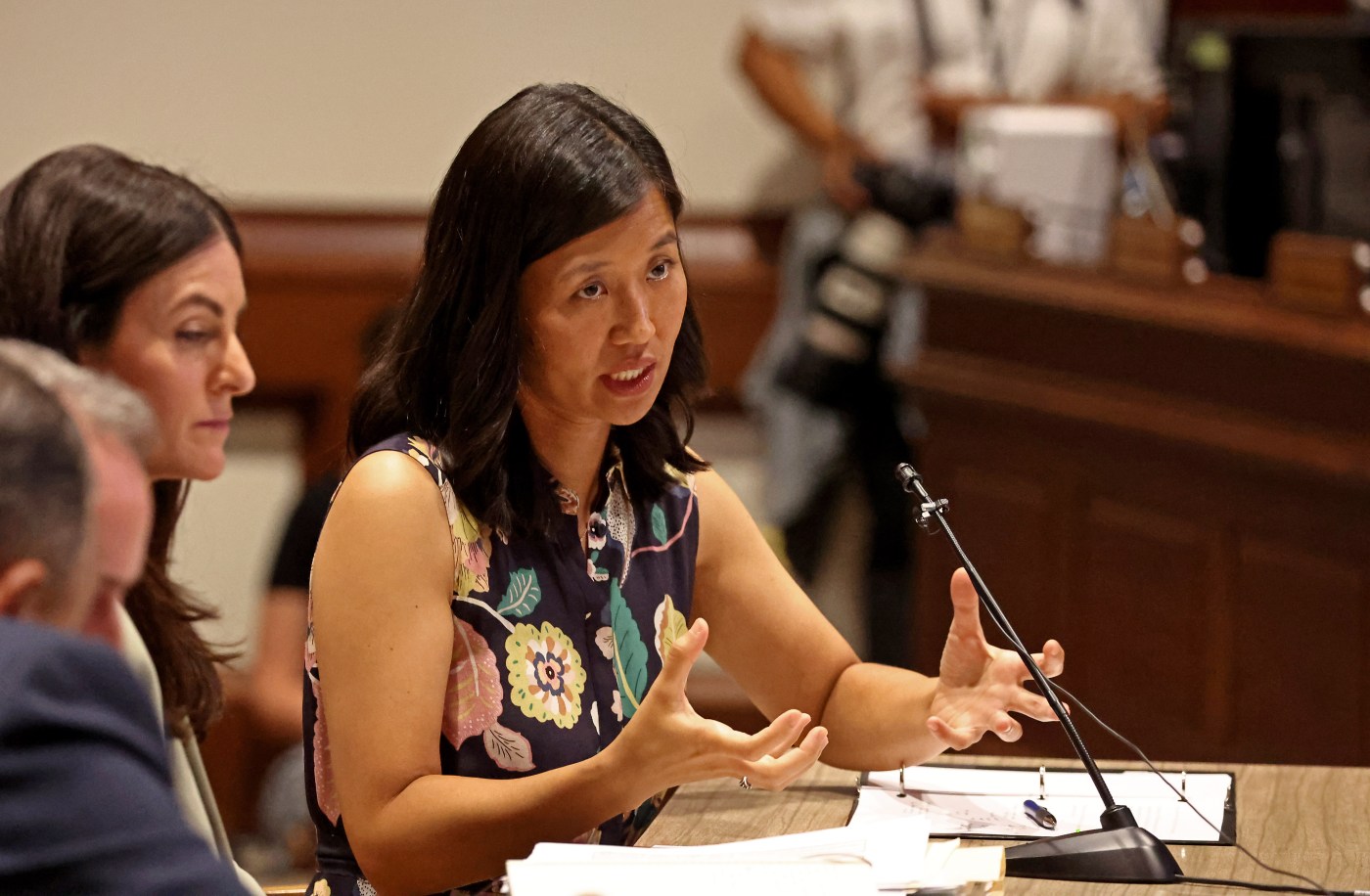
Boston Mayor Wu pushes state lawmakers to approve business tax hike: ‘Best’ option
Boston Mayor Michelle Wu framed her plan to increase commercial tax rates as a necessary evil during a hearing before state lawmakers, saying residents may be forced out of their homes if the bill doesn’t pass and their property tax bills spike next year.
Wu and her top two financial chiefs batted away concerns from skeptical members of the state Legislature’s Joint Committee on Revenue at a Tuesday hearing, where the mayor’s administration insisted that its proposed “emergency law” is the only reasonable option for how the city can provide short-term tax relief for residents.
The plan has faced persistent criticism from business leaders and fiscal watchdogs that it would cause more harm to businesses in a commercial sector already struggling with declining property values and vacant downtown office space.
“I am not here presenting this legislation because I wanted to do something that would hurt,” Wu said. “I am here because we have a potential problem that we need to fix in the short term for residents.
“I wish there was a way, with a completely different tax system, where we could tailor each one to each individual business’ needs or the residents’,” the mayor added. “But we have the system that we have and this is a tool that unfortunately we know works.”
Wu has said that due to the city budget’s reliance on property taxes, which make up nearly three-quarters of annual budgetary revenue, about a third of which comes from the commercial sector, a continued decline in commercial property values is projected to push more of the tax burden onto residents next year.
She testified that homeowners could be hit with a 33% increase in taxes if state lawmakers don’t approve her plan, which would give the city the authority to tax businesses beyond the state limit for four years, to avoid that scenario.
The city proposed, and received state approval, for nearly identical legislation two decades ago when homeowners were facing a roughly 40% increase in taxes.
A “33% spike in residential property taxes would be devastating,” Wu said, citing feedback she’s received from the community, “not only for our residents, but for all our businesses who rely on our residents as customers, clients and employees.”
“Our proposal would give the city the tools we need to protect residential taxpayers and keep all of our residents, homeowners and renters, in their homes,” she said.
The mayor emphasized that business owners would still see a decline in property taxes next year, though not by as much as they would if her plan doesn’t pass.
The commercial sector has largely rejected that argument, however, pointing to the potential the proposal has for exacerbating declining property values and the disproportionate harm it could create for small businesses. Landlords could pass on their higher taxes to small businesses through increased costs such as higher rents, critics have said.
A similar argument was made by Jessica Muradian of the Massachusetts Restaurant Association, who testified that small businesses from East Boston to Mattapan would “bear the brunt of the tax increases despite already facing additional expenses due to inflation, higher interest rates, and other market factors.”
“To me, this can be a very dangerous tool,” state Rep. Francisco Paulino, a member of the state legislative committee, said, after citing concerns with how the plan would impact small businesses.
Other committee members were more muted in their response to the mayor’s plan, though House Chair Mark Cusack made it a point to somewhat dispute Wu’s testimony that residents could be facing a 33% tax increase next year.
That spike would be from the second to third quarter, Cusack said, whereas the actual year-over-year tax increase in Boston would be roughly 16.5%.
Numbers cited by Nicholas Ariniello, Boston’s commissioner of assessing, supported the 16.5% increase. He said the average-single family tax bill was $5,522 with the residential exemption in 2024, and would increase to $6,432 next year, if the legislation were not to pass.
Related Articles
Boston City Council takes on public ‘disconnect’ with development
Franklin Park’s White Stadium planned renovation moves forward despite legal spat
Boston agrees to pay $1 million to settle City Hall sexual harassment lawsuit
Massachusetts ranked among worst states for business as Boston pushes for higher taxes
Boston announces health initiative, $10M grant to improve life expectancy
State lawmakers also questioned the Wu administration as to why it was pursuing an option that requires approval from Beacon Hill, rather than pulling from the city’s roughly $1 billion reserves or cutting spending. The city’s budget grew by 8% this year.
Ashley Groffenberger, the city’s chief financial officer, said the other options are not good ones, in the administration’s opinion, citing the potential impact they would have on the city’s strong AAA bond rating and city services.
“This tool really helps provide and preserve the stability for the city,” Groffenberger said, while citing a reluctance to drain the city’s reserve fund “to plug a hole one time” and then have to potentially come before the Legislature again in a worse position, with no savings.
The mayor added, “We’re here because this tool is the best tool.”
The day’s hearing ended without a recommendation from the joint committee, which will decide whether to move it forward to the full Legislature.
Boston Chief Financial Officer, Collector-Treasurer Ashley Groffenberger testifies at Tuesday’s hearing at the State House. (Staff Photo By Stuart Cahill/Boston Herald)


